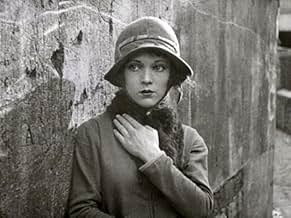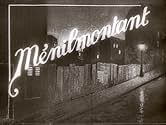Ménilmontant
- 1926
- 38min
VALUTAZIONE IMDb
7,8/10
2861
LA TUA VALUTAZIONE
Aggiungi una trama nella tua linguaA couple is brutally murdered in the working-class district of Paris. Later on, the narrative follows the lives of their two daughters, both in love with a Parisian thug and leading them to ... Leggi tuttoA couple is brutally murdered in the working-class district of Paris. Later on, the narrative follows the lives of their two daughters, both in love with a Parisian thug and leading them to separate ways.A couple is brutally murdered in the working-class district of Paris. Later on, the narrative follows the lives of their two daughters, both in love with a Parisian thug and leading them to separate ways.
Recensioni in evidenza
This is one that no one can afford to miss in a lifetime of viewing, that is no one who's interested in the deepest workings of how things move. In my third viewing now, it may just be the pinnacle of the first 30 years. But before saying more, let's quickly clear the air from fixed perceptions so it can rise up in front of us vibrantly as what it is, all the more greater.
First to reclaim it from the museum of merely academic appreciation that covers, silents in particular, with the shroud of musky relic. Coming to us from so far back it may appear as the studied work of a venerable master - and yet it's the work of a 25 year old (filming started in '24) who shot it by himself with his girl around Paris, hand-held, and edited in camera.
The workings of fate or grande history that demand crowds and decor are pushed to the side, this is a youthful cinema ("indie" we would call it now) that beats with the heart of young people trying to fathom life in the complex city and I urge you see it as such. Kirsanov was an émigré new to Paris after all. Watch it as puzzling modern life that keeps you awake at nights, not as some scholar's symbolism.
Then to reclaim it from the clutches of "experimental" and "avant- garde", labels as though it were just about the tweaking of form, an exercise of trying to be ahead of time. There are many of those from the era, marvelous experiments in seeing, and Kirsanov was not just a wide-eyed country boy - he had articles published on "photogenie" before he made this and would know the radical tropes. But this enters beyond.
The best way I find myself able to describe it is this.
There's a story here that you can unfold in a way that it makes simple sense, melodrama about an orphaned girl lost in the big city. Melodrama since well before of course, offered us a certain facsimile of life where this clearly begat that, the disparity caused grief, the resolutions restored clarity. There's a heart breaking scene here on a bench worthy of Chaplin. She wanders with a baby cradled in her arms, trials and tribulations that innocence must go through.
Now this facsimile rippled and violently tossed about like curtains at an open window are shuffled by gusts of air, ellipsis, abstraction, rapid-fire montage, and all the other tools that Kirsanov would have known from being in Paris at the time of Epstein and others. So far so good. The film would have been great with just this mode, wholly visual, "experimental". The girl Nadia is lovely, the air dreamlike.
But there's something else he does, that is still in the process of being fathomed decades later by penetrative thinkers like Lynch. There are hidden machinations in the world of the film, illogical machinery at play, that turn at a level deeper than we can clearly fathom at any point. You should know here that Kirsanov had to cross a Europe collapsing by war and revolutions to reach Paris, he would have found out months after he left home that his father had been murdered on the street by communist thugs.
Suddenly there is the nagging sense of a presence that moves behind appearances, giving rise to mysteriously connected perturbations. A marvelous sequence shows one sister being seduced in a room (uncertain, but giving in), the other sister alone in their bed reading from a book as if daydreaming the whole dalliance.
And then the second sister knowingly letting herself be seduced, the first observing the scene from below as if she has splintered off into separate selves, one being seduced above, the other realizing in hallucinative daydream the mistake of giving herself to this boy.
This is marvelous. Impulses from an open window, and through the flimsy fabric of the curtains, the vague coming and going of people in a room, half-finished glimpses, but we begin to sense pattern here. Two girls, two murders, two seductions, but one calculated and wrong.
The most startling moment is the opening; a puzzling violence has stolen into this world, creating the story, rendered with haunting imagery of a struggle before a window. Now every account of the film I've read believes these are the parents of the girls and some madman, but this is not said anywhere. In the graveyard after, we see the father's grave with wreaths, a funeral that day, but none on the mother's, it looks abandoned. Maybe someone was caught where he shouldn't have been, calculated and wrong.
And this veiled and bubbling causality goes through everything to appear again in the finale; the first murder wasn't random, what says the second is? Maybe a holdup just so happened to visit him, maybe someone was paid off. The door is open, you go in where your body takes you.
Something to meditate upon
First to reclaim it from the museum of merely academic appreciation that covers, silents in particular, with the shroud of musky relic. Coming to us from so far back it may appear as the studied work of a venerable master - and yet it's the work of a 25 year old (filming started in '24) who shot it by himself with his girl around Paris, hand-held, and edited in camera.
The workings of fate or grande history that demand crowds and decor are pushed to the side, this is a youthful cinema ("indie" we would call it now) that beats with the heart of young people trying to fathom life in the complex city and I urge you see it as such. Kirsanov was an émigré new to Paris after all. Watch it as puzzling modern life that keeps you awake at nights, not as some scholar's symbolism.
Then to reclaim it from the clutches of "experimental" and "avant- garde", labels as though it were just about the tweaking of form, an exercise of trying to be ahead of time. There are many of those from the era, marvelous experiments in seeing, and Kirsanov was not just a wide-eyed country boy - he had articles published on "photogenie" before he made this and would know the radical tropes. But this enters beyond.
The best way I find myself able to describe it is this.
There's a story here that you can unfold in a way that it makes simple sense, melodrama about an orphaned girl lost in the big city. Melodrama since well before of course, offered us a certain facsimile of life where this clearly begat that, the disparity caused grief, the resolutions restored clarity. There's a heart breaking scene here on a bench worthy of Chaplin. She wanders with a baby cradled in her arms, trials and tribulations that innocence must go through.
Now this facsimile rippled and violently tossed about like curtains at an open window are shuffled by gusts of air, ellipsis, abstraction, rapid-fire montage, and all the other tools that Kirsanov would have known from being in Paris at the time of Epstein and others. So far so good. The film would have been great with just this mode, wholly visual, "experimental". The girl Nadia is lovely, the air dreamlike.
But there's something else he does, that is still in the process of being fathomed decades later by penetrative thinkers like Lynch. There are hidden machinations in the world of the film, illogical machinery at play, that turn at a level deeper than we can clearly fathom at any point. You should know here that Kirsanov had to cross a Europe collapsing by war and revolutions to reach Paris, he would have found out months after he left home that his father had been murdered on the street by communist thugs.
Suddenly there is the nagging sense of a presence that moves behind appearances, giving rise to mysteriously connected perturbations. A marvelous sequence shows one sister being seduced in a room (uncertain, but giving in), the other sister alone in their bed reading from a book as if daydreaming the whole dalliance.
And then the second sister knowingly letting herself be seduced, the first observing the scene from below as if she has splintered off into separate selves, one being seduced above, the other realizing in hallucinative daydream the mistake of giving herself to this boy.
This is marvelous. Impulses from an open window, and through the flimsy fabric of the curtains, the vague coming and going of people in a room, half-finished glimpses, but we begin to sense pattern here. Two girls, two murders, two seductions, but one calculated and wrong.
The most startling moment is the opening; a puzzling violence has stolen into this world, creating the story, rendered with haunting imagery of a struggle before a window. Now every account of the film I've read believes these are the parents of the girls and some madman, but this is not said anywhere. In the graveyard after, we see the father's grave with wreaths, a funeral that day, but none on the mother's, it looks abandoned. Maybe someone was caught where he shouldn't have been, calculated and wrong.
And this veiled and bubbling causality goes through everything to appear again in the finale; the first murder wasn't random, what says the second is? Maybe a holdup just so happened to visit him, maybe someone was paid off. The door is open, you go in where your body takes you.
Something to meditate upon
The Ménilmontant depicted here by Dimitri Kirsanofff is a far cry from the picturesque village of Charles Trenet's famous chanson. The grim and narrow cobbled streets provide a backdrop for a film of which the subject matter is that of conventional melodrama but which has been raised by Dimitri Kirsanoff to the level of cinematic art.
The stylistic effects he employs are those of Impressionism, notably rapid montage, superimposition and flashbacks but never at the expense of the narrative and nigh-on a century later the film's emotive power has not diminished and remains a devastating piece of social realism which concerns two orphaned sisters who are eventually reconciled, having been betrayed by the same man.
Suffice to say the lynchpin is the director's wife and muse Nadia Sibirskaia whose face is adored by the camera and whose performance as the younger sister is stunning in its simplicity.
The mood of the film is heightened by the newly composed score of the talented Paul Mercer.
This is the second and indeed oldest surviving film of Russian émigré Kirsanoff and although to my knowledge he never again reached such heights this piece of ciné poetry guarantees his immortality.
The stylistic effects he employs are those of Impressionism, notably rapid montage, superimposition and flashbacks but never at the expense of the narrative and nigh-on a century later the film's emotive power has not diminished and remains a devastating piece of social realism which concerns two orphaned sisters who are eventually reconciled, having been betrayed by the same man.
Suffice to say the lynchpin is the director's wife and muse Nadia Sibirskaia whose face is adored by the camera and whose performance as the younger sister is stunning in its simplicity.
The mood of the film is heightened by the newly composed score of the talented Paul Mercer.
This is the second and indeed oldest surviving film of Russian émigré Kirsanoff and although to my knowledge he never again reached such heights this piece of ciné poetry guarantees his immortality.
10sandover
Poverty, disillusion, and yet grace graces the screen when Nadia Sibirskaya nods to the old man who offers her some food to chew. That scene, that means her social grace, brought me tears and elated me at once - miracles, oh yes, do and do happen and move.
One should note that the old man does not reciprocate, in fact does not look at her at all, and this marks Kirsanoff's extraordinary finesse: if there was some kind of "communication" between the two, THIS would be melodramatic; for I do not think this film is a melodrama, at least the way we have come to mean one. To deny that the story is something that could have "happened", is to deny the film's class and émigré conscience.
On the other hand I am not sure I would claim, as another reviewer did, that this is Zola-like; we would then be a bit far from "Menilmontant"'s drastic, dislocated lyricism.
Watch the cutting close-ups the two times Sibirskaya's eloquent face witnesses a violent scene: the camera, a bit dislocated each time, and unafraid to jump and shut transitive seconds.
Watch the scene where she strongly contemplates something and starts descending the steps to the river: there is a sense of menace and imminent loss, I am not sure I ever witnessed before in a film: this is film-making on the heights; as is the camera work which frames hesitant feet on the steps, and hushes astonishingly their turning round.
Watch the protagonist's face after she arguably loses her virginity: inscrutable and fascinating, not allowing us truly tell if the vision of her wandering in the woods is one of innocence lost or burgeoning sexuality. But there is, that is a visceral sense of feminine enjoyment, perhaps close to a Balthus painting mood.
At the end one is left with a sense of bifurcation: with sisters reconciled, we are left with a confusing and not redeeming crime. We don't know who or why exactly and if the girl involves herself out of vengeance, private reasons or what you will; that makes it all the more unsavory and artistically right.
Then the camera looks disjointedly up into the Parisian sky, and hands resume their work of artificial bouquets; yes, the film seems to suggest, this is all what one is left with, artificial bouquets and handiwork.
Two sisters, two deflorations, two crimes, twice the work of flowers: the work of the two Kirsanoffs genial, amazing sensibilities.
One should note that the old man does not reciprocate, in fact does not look at her at all, and this marks Kirsanoff's extraordinary finesse: if there was some kind of "communication" between the two, THIS would be melodramatic; for I do not think this film is a melodrama, at least the way we have come to mean one. To deny that the story is something that could have "happened", is to deny the film's class and émigré conscience.
On the other hand I am not sure I would claim, as another reviewer did, that this is Zola-like; we would then be a bit far from "Menilmontant"'s drastic, dislocated lyricism.
Watch the cutting close-ups the two times Sibirskaya's eloquent face witnesses a violent scene: the camera, a bit dislocated each time, and unafraid to jump and shut transitive seconds.
Watch the scene where she strongly contemplates something and starts descending the steps to the river: there is a sense of menace and imminent loss, I am not sure I ever witnessed before in a film: this is film-making on the heights; as is the camera work which frames hesitant feet on the steps, and hushes astonishingly their turning round.
Watch the protagonist's face after she arguably loses her virginity: inscrutable and fascinating, not allowing us truly tell if the vision of her wandering in the woods is one of innocence lost or burgeoning sexuality. But there is, that is a visceral sense of feminine enjoyment, perhaps close to a Balthus painting mood.
At the end one is left with a sense of bifurcation: with sisters reconciled, we are left with a confusing and not redeeming crime. We don't know who or why exactly and if the girl involves herself out of vengeance, private reasons or what you will; that makes it all the more unsavory and artistically right.
Then the camera looks disjointedly up into the Parisian sky, and hands resume their work of artificial bouquets; yes, the film seems to suggest, this is all what one is left with, artificial bouquets and handiwork.
Two sisters, two deflorations, two crimes, twice the work of flowers: the work of the two Kirsanoffs genial, amazing sensibilities.
There is an old German proverb that says that size doesn't matter ( well, size does count for this count having in mind the perimeter of his Teutonic heiresses
) and the saying rings true with "Ménilmontant" a medium-length silent film directed by Herr Dimitri Kirsanoff, and a striking, disturbing masterpiece.
Herr Kirsanoff's direction is astonishing in every aspect of the film, particularly in its technique. It's a mixture of drama, avant-garde, experimental film and hyper realism. The story depicted in the film ( the terrible life of two orphan sisters ) doesn't allow any concession to the audience; to watch "Ménilmontant" today still invokes amazement, distress and an infinite sadness.
From the very start of the film ( superb, striking and masterful editing by Herr Kirsanoff himself ) the director shows power and imagination and a strong control of film narrative ( there is no need of intertitles ). Kiransoff's use of imagery is thrilling and brilliant. Images emphasize a ruined happy childhood and the duality and dangers of a big city ( flashbacks, imaginative camera angles, dreamy and poetic shots ) not to mention the sorrowful life of the two orphans, an existence of loneliness, abandonment and despair that broke the heart of a heartless German aristocrat, especially the superb scene in which the younger sister ( touching Dame Nadia Sibirskaia ) ,alone and hungry on a bench park with her baby, accepts some bread from an old man, a moving and lyrical scene, that summarizes the spirit and achievement of this oeuvre.
"Ménilmontant" is a work of art, a striking experimental style in the service of a tragic and sad story, brilliantly and disturbingly balanced.
And now, if you'll allow me, I must temporarily take my leave because this German Count must become a little livelier.
Herr Graf Ferdinand Von Galitzien http://ferdinandvongalitzien.blogspot.com/
Herr Kirsanoff's direction is astonishing in every aspect of the film, particularly in its technique. It's a mixture of drama, avant-garde, experimental film and hyper realism. The story depicted in the film ( the terrible life of two orphan sisters ) doesn't allow any concession to the audience; to watch "Ménilmontant" today still invokes amazement, distress and an infinite sadness.
From the very start of the film ( superb, striking and masterful editing by Herr Kirsanoff himself ) the director shows power and imagination and a strong control of film narrative ( there is no need of intertitles ). Kiransoff's use of imagery is thrilling and brilliant. Images emphasize a ruined happy childhood and the duality and dangers of a big city ( flashbacks, imaginative camera angles, dreamy and poetic shots ) not to mention the sorrowful life of the two orphans, an existence of loneliness, abandonment and despair that broke the heart of a heartless German aristocrat, especially the superb scene in which the younger sister ( touching Dame Nadia Sibirskaia ) ,alone and hungry on a bench park with her baby, accepts some bread from an old man, a moving and lyrical scene, that summarizes the spirit and achievement of this oeuvre.
"Ménilmontant" is a work of art, a striking experimental style in the service of a tragic and sad story, brilliantly and disturbingly balanced.
And now, if you'll allow me, I must temporarily take my leave because this German Count must become a little livelier.
Herr Graf Ferdinand Von Galitzien http://ferdinandvongalitzien.blogspot.com/
Menilmontant (1926) was, in the modest context of the alternative cinema circuit, a smash hit. It's great success allowed filmmaker Dimitri Kirsanov to go on making films, and also helped Jean Tedesco to stay in business as an exhibitor.
Like Kirsanov's first film, Menilmontant (again starring Kirsanoff's first wife, the beautiful Nadia Sibirskaia) tells a story without the use of inter-titles. It is often said that the filmmakers cinema is poetic, but one must add that in his second film he explored the poetics of violence and degradation.
The story begins and ends with two unrelated, but similarly filmed and edited murders. In each case, the grisly event does not grow organically out of the plot, but seems to surge out of a world welling with violent impulses.
Menilmontant uses practically all of the typical stylistic devices of cinematic impressionism, but it is hard to consider it as in any way representative of the movement. It's overwhelming, virtually unrelieved violence and despair seem to infect its own storytelling agency, upsetting what in other filmmakers' works would be clearly delineated relations of parts to the whole.
The film contains several bursts of rapid editing, for example, but they are not rhythmic in any simple, narratively justified way (in the manner of Abel Gance, for example); their meter is complicated and unsettling, worthy of an Igor Stravinsky. The film offers several notable examples of subjective camera work, but typically these become slightly unhinged, with no absolute certainty as to which character's experience in being rendered.
Menilmontant is, quite deliberately, a film in which the formal center cannot hold, because it is about a world in which this is also true. Although certainly not a Surrealist work, it shares with Surrealism no only a fascination with violence and sexuality, but also a display of forces and transcend, and question the boundaries of, individual human consciousness.
Kirsanov concluded his Menilmontant with a shot of impoverished and exploited young women fashioning artificial flowers in the poorest district of Paris, he provided us the most comprehensive image, aesthetic and social, of this form of cinema. Through a panoply of stylistic experiments and through glorious close-ups of the incomparably fragile face of Sibirskaia, Kirsanov thought he had shaped a harsh milieu into an exquisite flower. But a flower for whom? Menilmontant would become a major film on the cine-club and specialized cinema circuit, but never played to the people of the working class quatier that gave it its title. This was not Kirsanov's public anyway, for he came from the Russian aristocracy. In 1919, having fled the Revolution, he was reduced to playing his beloved cello in movie houses just to be able to eat. He must have been tempted to imagine himself and his music as an unappreciated flower in the crude milieu of mass art.
Seen this way, Menilmontant becomes a personal triumph of art over industry, of the icon of Sibirskaia over the brutal world of plot and spectacle that constitutes ordinary cinema. That triumph is signaled in the miracle of the film's narration, the first French film without titles, a tale told completely through the eloquence of its images. The dark alleys of the nineteenth arrondissment, the streetlights listening on the Seine, and the pathetic decor of shabby apartments are all redeemed by art. No silent film more clearly bewails the fate of art in our century, more obviously appeals to connoisseurs of the emotions roused by artificial flowers.
Like Kirsanov's first film, Menilmontant (again starring Kirsanoff's first wife, the beautiful Nadia Sibirskaia) tells a story without the use of inter-titles. It is often said that the filmmakers cinema is poetic, but one must add that in his second film he explored the poetics of violence and degradation.
The story begins and ends with two unrelated, but similarly filmed and edited murders. In each case, the grisly event does not grow organically out of the plot, but seems to surge out of a world welling with violent impulses.
Menilmontant uses practically all of the typical stylistic devices of cinematic impressionism, but it is hard to consider it as in any way representative of the movement. It's overwhelming, virtually unrelieved violence and despair seem to infect its own storytelling agency, upsetting what in other filmmakers' works would be clearly delineated relations of parts to the whole.
The film contains several bursts of rapid editing, for example, but they are not rhythmic in any simple, narratively justified way (in the manner of Abel Gance, for example); their meter is complicated and unsettling, worthy of an Igor Stravinsky. The film offers several notable examples of subjective camera work, but typically these become slightly unhinged, with no absolute certainty as to which character's experience in being rendered.
Menilmontant is, quite deliberately, a film in which the formal center cannot hold, because it is about a world in which this is also true. Although certainly not a Surrealist work, it shares with Surrealism no only a fascination with violence and sexuality, but also a display of forces and transcend, and question the boundaries of, individual human consciousness.
Kirsanov concluded his Menilmontant with a shot of impoverished and exploited young women fashioning artificial flowers in the poorest district of Paris, he provided us the most comprehensive image, aesthetic and social, of this form of cinema. Through a panoply of stylistic experiments and through glorious close-ups of the incomparably fragile face of Sibirskaia, Kirsanov thought he had shaped a harsh milieu into an exquisite flower. But a flower for whom? Menilmontant would become a major film on the cine-club and specialized cinema circuit, but never played to the people of the working class quatier that gave it its title. This was not Kirsanov's public anyway, for he came from the Russian aristocracy. In 1919, having fled the Revolution, he was reduced to playing his beloved cello in movie houses just to be able to eat. He must have been tempted to imagine himself and his music as an unappreciated flower in the crude milieu of mass art.
Seen this way, Menilmontant becomes a personal triumph of art over industry, of the icon of Sibirskaia over the brutal world of plot and spectacle that constitutes ordinary cinema. That triumph is signaled in the miracle of the film's narration, the first French film without titles, a tale told completely through the eloquence of its images. The dark alleys of the nineteenth arrondissment, the streetlights listening on the Seine, and the pathetic decor of shabby apartments are all redeemed by art. No silent film more clearly bewails the fate of art in our century, more obviously appeals to connoisseurs of the emotions roused by artificial flowers.
Lo sapevi?
- QuizPauline Kael said this was her favorite film of all time.
- Versioni alternativeThis film was published in Italy in an DVD anthology entitled "Avanguardia: Cinema sperimentale degli anni '20 e '30", distributed by DNA Srl. The film has been re-edited with the contribution of the film history scholar Riccardo Cusin . This version is also available in streaming on some platforms.
- ConnessioniFeatured in The language of the silent cinema 1895-1929 - Part II: 1926-1929 (1973)
I più visti
Accedi per valutare e creare un elenco di titoli salvati per ottenere consigli personalizzati
Dettagli
- Tempo di esecuzione38 minuti
- Colore
- Mix di suoni
- Proporzioni
- 1.33 : 1
Contribuisci a questa pagina
Suggerisci una modifica o aggiungi i contenuti mancanti

Divario superiore
By what name was Ménilmontant (1926) officially released in Canada in English?
Rispondi
















